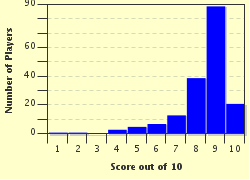Quiz Answer Key and Fun Facts
1. We shall begin with the author of classics such as "The Time Machine" and "The War of the Worlds". Needless to say, he is H.G. Wells. But, what do the first initials stand for?
2. This man has been a popular candidate for having authored the plays attributed to William Shakespeare. The works tagged under his name include "The Passionate Shepherd to his Love". What was his name?
3. We all know that the victor of Waterloo was Arthur Wellesley, 1st Duke of Wellington. We also know that he had the moniker "Iron Duke". Why was it given to him?
4. One of the most important scientists ever, this Englishman formulated the laws of motion and universal gravitation and also developed calculus, something Gottfried Leibniz also did at the same time, but independently. What was his name?
5. He was the chief instrument in the British victory of the Second Battle of El Alamein. With the help of Harold Alexander and he led the British forces at Operation Overlord. What was his name?
6. That poet was one of the most important English Romantics, especially with his series of odes, such as "Ode to a Nightingale" and "Ode to a Grecian Urn". What was his name?
7. Blackbeard was one of the most notorious pirates ever. We know that his surname was Teach (or Thatch), but what was his first name?
8. This King of England was the second Tudor monarch. He brought both the Renaissance and the Protestant Reformation to his country, although he is best known for his six wives. Who was he?
9. The theory of evolution was significantly developed in the book "On the Origin of Species". Who was its author?
10. It's always nice to end with a lady. That particular one was a novelist and playwright, whose novel "Rebecca" was later adapted into a film by Alfred Hitchcock. What was her name?
Source: Author
DeepHistory
This quiz was reviewed by FunTrivia editor
bloomsby before going online.
Any errors found in FunTrivia content are routinely corrected through our feedback system.


